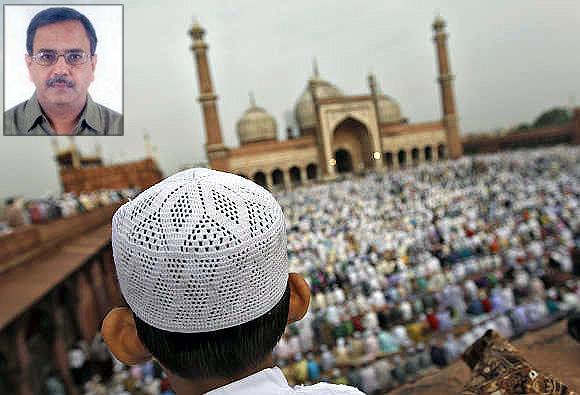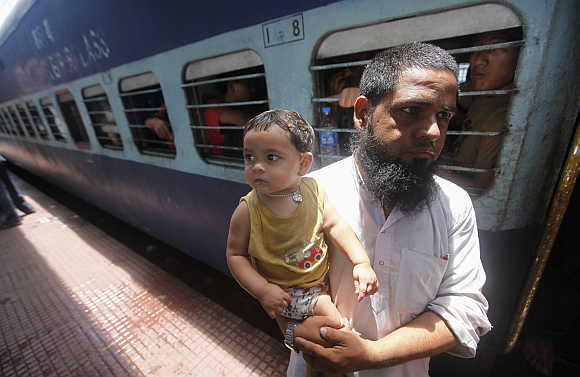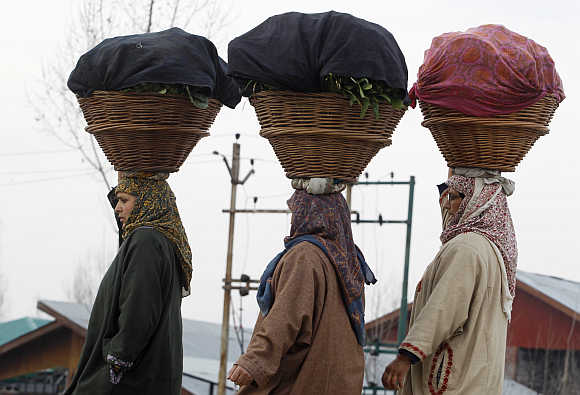Faisal Kidwai
The participation of Muslims is relatively low in the education space but has improved in recent years, says Rakesh Basant, professor of economics, Indian Institute of Management-Ahmedabad, who has conducted a study on education and employment among Muslims, in an email interview to Faisal Kidwai.
An excerpt from the exchange:
What was the motivation behind your study?
I have been working on the issues relating to Muslims in India after the submission of the Rajinder Sachar Committee's (of which I was a member) report. My recent work has mainly focused on access to higher education by different socio-religious groups.
Could you share with us some of the major findings of the study?
Compared with other communities, Muslims have a higher perception of unfairness, and this sense of discrimination is especially high in the employment and education sector. The participation of Muslims is relatively low in the education space but has improved in recent years.
However, the situation is particularly poor in urban areas, especially for Muslim males.
While there is some evidence to suggest that Muslims choose self-employment to avoid discrimination in the formal labour market, educational endowments. Other attributes, such as experience explain a large part of the differentials across socio-religious categories in participation in regular employment, as well as earnings.
...
'I recommend exploring non-quota based affirmative action'
Image: Photo used for representational purposes onlyHow much is discrimination responsible for the present state of Muslims?
Discrimination certainly plays a role, but the available studies suggest that a large part of differences across socio-religious groups in employment can be explained by endowments of education etc across groups.
For higher education, once the marginalised groups (including Muslims) are able to cross the eligibility barrier (ie, cross the threshold of school education), the differences across groups decline dramatically.
Inability to cross the eligibility barrier therefore is the main factor responsible for lower participation in higher education. This can be because of a combination of factors: inadequate supply of schools in the vicinity, inappropriate attitude towards education, perceptions about discrimination in the job market adversely affecting participation in education, and so on.
The study has suggested reservations for Muslims. But, given the anger against the quota system, won't it fuel discrimination against Muslims? And, how do we make sure that it benefits only those who actually need it?
My study has not suggested reservation for Muslims. In fact, I am recommending exploration of non-quota based affirmative action.
A line in my paper has been quoted out of context.
The data I analyse shows that the deficits in higher education participation are higher for Muslims than for Hindu-OBCs. In fact, according to some estimates, the share of Hindu-OBCs participating in higher education is more than their quota of 27 per cent.
...
'Key thing is to ride on the emerging interest in education among Muslims'
On the basis of this comparison, I had said that if deficits in participation are to be the basis of reservation, Muslims qualify more. However, once we control for all other factors such as region, economic status etc, parental education rather than caste or religion turns out to be a more important factor.
And therefore, one can argue that if (I am not recommending it) reservation is the policy instrument that needs to be used, then it (the reservation) should be for those whose parents are illiterate as the effect of parental education persists in a significant manner even after we control for region, caste, religion and economic status.
But overall, I am in favour of non-quota based policy instruments.
What other steps are needed to improve the condition of Muslims?
I think the key thing is to ride on the emerging interest in education among Muslims in India. Their enrollment rates have increased dramatically in recent years.
Leveraging this interest, policies should help them cross the school threshold which may involve better supply of school infrastructure in the vicinity of where they live, and some financial support.
...




article